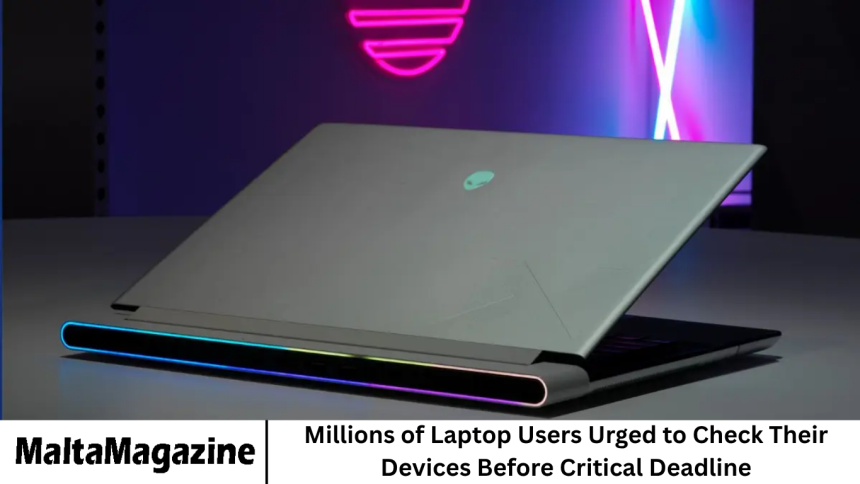A major global alert has been issued to laptop owners worldwide, urging millions of users to check their devices before an important upcoming deadline. The warning has been raised due to potential safety, performance, and security risks identified in certain laptop models and operating systems.
- Why Are Laptop Users Being Warned Now?
- How to Check If Your Laptop Is Affected
- Visit the Manufacturer’s Official Support Page:
- Check for System Updates:
- Inspect the Battery and Charger:
- Scan for Firmware or BIOS Updates:
- Check Warranty and Service Notifications:
- The Role of Cybersecurity Concerns
- Battery and Hardware Recall Issues
- Software Compatibility and Operating System Deadlines
- How Businesses and Institutions Are Responding
- Steps Users Should Take Before the Deadline
- Backup Important Files:
- Install All Pending Updates:
- Replace Faulty Components:
- Run a Security Scan:
- Check for BIOS or Firmware Updates:
- Monitor System Performance:
- Verify Warranty Status:
- Keep Proof of Compliance:
- What Happens If You Miss the Deadline?
- A Wake-Up Call for Digital Responsibility
- Frequently Asked Question
- Conclusion
Authorities, tech giants, and cybersecurity experts have all highlighted the urgency of this situation, emphasizing that failing to take action before the deadline could expose users to serious vulnerabilities.
The alert, which has gained widespread attention across social media and tech forums, is not just about one brand or model. Instead, it covers a range of laptops from major manufacturers including HP, Dell, Lenovo, Asus, Acer, and Apple.
More Read: Meta-Flux Raises $2M to Build “AI Biologist” for Next-Gen Drug Discovery
Why Are Laptop Users Being Warned Now?
The urgent warning stems from multiple overlapping developments in the tech industry. First, several manufacturers and operating system providers have rolled out critical updates meant to address serious vulnerabilities discovered over the past few months.
These vulnerabilities, if left unpatched, could be exploited by cybercriminals to gain unauthorized access, install malicious software, or corrupt system data. Secondly, environmental and hardware safety agencies in regions such as the United States, Europe.
And Asia have issued recall notices for specific laptop batteries and chargers. Faulty battery units in particular have been linked to overheating incidents, posing a potential fire risk. These recalls come with strict replacement deadlines, beyond which affected users may no longer qualify for free battery replacements.
In addition, Microsoft and Apple have recently implemented new digital certificate requirements for Windows and macOS systems. Users running outdated firmware or operating system versions could soon face compatibility issues or even be blocked from receiving essential security patches.
Together, these factors have led to a global message urging all laptop users to verify that their systems are updated, safe, and compliant before the set deadline.
How to Check If Your Laptop Is Affected
Laptop users are being advised to take immediate action to determine whether their devices fall under the affected categories. While the specific process varies depending on the manufacturer, the following steps apply to most major brands:
Visit the Manufacturer’s Official Support Page:
Each company—whether it’s HP, Dell, Lenovo, Acer, Asus, or Apple—has a dedicated support section that allows users to check for recalls or updates. By entering the serial number or product ID, users can quickly find out if their laptop is included in any current safety or firmware alert.
Check for System Updates:
- Windows Users: Go to Settings > Windows Update and check for pending updates.
- macOS Users: Open System Settings > General > Software Update.
- Chromebook Users: Navigate to Settings > About ChromeOS to see if updates are available.
Inspect the Battery and Charger:
Users should check whether their battery or charging adapter has been recalled. This information is usually displayed on the manufacturer’s recall page. Many companies also provide free replacement programs for faulty components.
Scan for Firmware or BIOS Updates:
Outdated BIOS or firmware versions can lead to instability or security flaws. Visiting the manufacturer’s support website and downloading the latest BIOS update is highly recommended.
Check Warranty and Service Notifications:
Many companies send out warranty alerts and repair notifications via registered email addresses. Users who purchased laptops from authorized retailers should ensure that their contact details are up to date with the manufacturer.
The Role of Cybersecurity Concerns
Beyond physical hardware issues, cybersecurity risks are a major reason for the current warning. Several recent data breaches and ransomware campaigns have specifically targeted laptops running outdated systems.
Hackers have developed sophisticated methods to exploit unpatched operating systems, especially those that have not been updated in months. A number of cybersecurity organizations have released data showing that over 60% of successful cyberattacks.
In 2025 occurred through vulnerabilities that had already been patched—but users had simply failed to install the updates. As laptops are often used for both personal and professional purposes, the risks are magnified, especially for remote workers who handle sensitive business data.
In addition, expired or outdated SSL and security certificates could prevent users from accessing secure websites or encrypted services, leading to possible interruptions in online banking, cloud backups, and file sharing.
The combined threat of malware, phishing, and ransomware has made it imperative for laptop owners to act swiftly and responsibly.
Battery and Hardware Recall Issues
One of the most alarming aspects of the alert involves the discovery of defective lithium-ion batteries in select laptop models. These batteries, manufactured between 2020 and 2023, have been reported to overheat and, in some rare cases, catch fire when exposed to prolonged charging cycles or high temperatures.
Manufacturers have already initiated recall campaigns, offering free battery replacements for affected units. However, the deadline for claiming these replacements is approaching fast—prompting the urgent reminder to users.
According to industry reports, over 5 million battery units across multiple brands are being replaced globally. Users who miss the deadline may have to purchase replacements out of pocket, costing anywhere from $80 to $200 depending on the model.
Hardware recalls are not limited to batteries alone. Some users have also been advised to replace malfunctioning keyboards, motherboards, and cooling fans that could affect overall performance.
While these issues are relatively rare, they underline the importance of checking the laptop’s model number against the manufacturer’s recall database.
Software Compatibility and Operating System Deadlines
Another critical reason for this alert involves software compatibility and system support timelines. Tech companies such as Microsoft, Apple, and Google regularly phase out support for older operating system versions.
Once the support period expires, these systems no longer receive security updates—making them vulnerable to new forms of cyberattacks. For instance, Microsoft has set upcoming deadlines for Windows 10 updates, urging users to upgrade to Windows 11 or the newer versions to ensure continued security support.
Similarly, Apple has announced that certain older Mac models will not receive the latest macOS updates beyond 2025. Chromebook users also face “Auto Update Expiration” (AUE) dates, after which the device stops receiving updates altogether.
Failing to upgrade or install necessary patches before these deadlines means users could soon be running outdated, unsafe software. This not only compromises data security but may also prevent users from running newer applications and tools essential for productivity.
How Businesses and Institutions Are Responding
The alert has not only affected individual consumers but also institutions and companies that rely heavily on laptops. Many organizations have started conducting mandatory IT audits to ensure that all employee laptops comply with the latest firmware, security, and hardware standards.
Educational institutions, banks, and healthcare providers—sectors that manage sensitive data—are especially taking this warning seriously. Some have even issued internal memos requiring staff to report the model number and last update status of their laptops by the end of the month.
In workplaces, IT departments are working overtime to push automatic updates through centralized systems, ensuring that employees’ devices are secure. Meanwhile, small businesses without dedicated IT teams are being encouraged to use automated security management tools to stay compliant.
This large-scale response reflects the growing understanding that technology upkeep is not just a personal responsibility—it’s also a professional necessity.
Steps Users Should Take Before the Deadline
Laptop owners are being strongly advised to follow a checklist to ensure their devices are safe, updated, and compliant before the approaching deadline:
Backup Important Files:
Save all critical data on external drives or cloud storage platforms to prevent loss during updates or repairs.
Install All Pending Updates:
Ensure that your operating system, drivers, antivirus software, and apps are fully up to date.
Replace Faulty Components:
If your battery or charger is under recall, request a replacement immediately through the manufacturer’s official site.
Run a Security Scan:
Use reputable antivirus or anti-malware tools to check for existing threats on your device.
Check for BIOS or Firmware Updates:
Update your laptop’s firmware to close any potential security loopholes.
Monitor System Performance:
Watch for signs such as overheating, unexpected shutdowns, or slower performance, which could indicate deeper issues.
Verify Warranty Status:
Confirm whether your laptop is still under warranty—some recalls or free replacements might only apply to covered devices.
Keep Proof of Compliance:
Save update confirmation messages or recall claim numbers in case you need to show proof later.
By taking these proactive measures, users can safeguard their data, extend their laptop’s lifespan, and avoid unnecessary costs.
What Happens If You Miss the Deadline?
Failing to act before the deadline could have several consequences depending on the type of issue involved. For software updates, missing the deadline could mean losing access to important security patches or cloud features.
For hardware recalls, it might mean paying out of pocket for replacements or repairs that would have otherwise been free. Additionally, users with unpatched systems could experience slower performance, compatibility errors, or even data corruption.
Cybersecurity experts warn that once public support for certain firmware or operating systems ends, hackers often target those users specifically, knowing their systems are easier to exploit.
While the exact deadline varies by manufacturer and region, most companies are encouraging users to act as soon as possible—ideally within the next few weeks—to avoid disruptions.
A Wake-Up Call for Digital Responsibility
This large-scale warning serves as a powerful reminder of how dependent modern life has become on digital devices. Laptops are no longer luxury tools—they are essential for communication, education, entertainment, and work. Yet many users overlook basic maintenance tasks like updating software or checking for recalls.
Experts say this incident underscores the need for a culture of “digital responsibility,” where users regularly perform health checks on their devices just as they would on a car or household appliance.
Simple habits like enabling automatic updates, keeping backups, and using official manufacturer tools can go a long way toward preventing problems. Governments and tech organizations are also exploring the idea of creating universal digital maintenance standards.
Ensuring that consumers are better informed about recalls, update deadlines, and cybersecurity best practices.
Frequently Asked Question
Why are laptop manufacturers issuing this urgent warning?
Manufacturers and regulatory agencies have discovered issues related to outdated software, faulty batteries, and security vulnerabilities. The warning urges users to update, check for recalls, and ensure system safety before the deadline.
Which laptop brands are affected by this alert?
The warning covers multiple brands, including HP, Dell, Lenovo, Acer, Asus, and Apple. However, not every model is affected. Users should check their manufacturer’s website using their serial number or product ID.
How can I find out if my laptop battery is recalled?
Visit your laptop brand’s official recall page and enter the battery’s serial number or product ID. If it’s listed, follow the provided instructions to receive a free replacement before the program deadline.
What are the cybersecurity risks if I ignore the update alerts?
Ignoring updates leaves your laptop vulnerable to malware, ransomware, and data breaches. Cybercriminals often exploit outdated systems that lack the latest security patches.
What should I do if my laptop is no longer receiving updates?
If your device has reached end-of-support, consider upgrading to a newer model or installing a lightweight, secure operating system alternative. Continuing to use unsupported software increases your security risk.
When is the deadline to take action?
The deadline varies by manufacturer and issue type. Most software updates and recall claims are expected to close within the next few weeks, so users should act immediately to avoid losing free support or replacements.
Can I still use my laptop if I miss the deadline?
Yes, but it may become less secure or stable. Missing the deadline could mean you no longer receive security patches, compatibility fixes, or free hardware replacements. It’s always best to act before time runs out.
Conclusion
The global warning urging millions of laptop users to check their devices before the critical deadline highlights the importance of staying proactive with technology. Whether the concern is a faulty battery, an expiring software version, or a security update.
Timely action can make the difference between a safe, efficient laptop and one that poses risks to both data and personal safety. As digital devices continue to evolve, users must remain vigilant. Regular maintenance, awareness of recalls, and prompt installation of updates are essential habits in today’s connected world.









